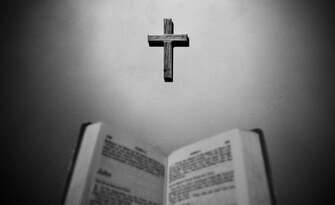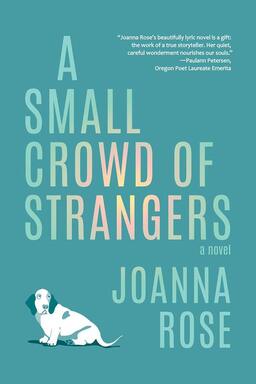What do you do when your long-term boyfriend’s dad might be dying? Well, you get married quick so he can make it, of course. You were already headed in that direction—I mean, you’re practically living together as it is. What harm could it do? He’s a nice guy, he just has a few quirks, but nothing you can’t handle. I’m sure the Catholic thing won’t come up much. Joanna Rose’s novel, A Small Crowd of Strangers, asks and answers the age-old question: “What happens if I marry the wrong person?” Rose paints a quaint life for Pattianne Anthony—a small town librarian with a casual sex life, a smoking habit, and a family that communicates with a series of unspoken words, if they communicate at all. All of that changes when she meets Michael Bryn, the choir boy who can do no wrong. Rose takes us on a spiritual journey with Pattianne as we begin to see that sometimes religion and identity can become one and the same. Pattianne was raised Catholic but she had grown to find that “freedom from religion was a sort of religion in itself. Religion meant the religious right”. Her lack of spirituality had never concerned her, and until Michael came along, she rarely even thought about God. She doesn’t believe in miracles. Michael claims to not mind that Pattianne isn’t a practicing Catholic, but she never explicitly tells him she doesn’t believe in God. In a way, Michael and Pattianne are polar opposites: Michael is a zealous believer and religion has penetrated every aspect of his life, while Pattianne couldn’t care less about God or church, and chooses to ignore Michael’s devotion. Rose deftly weaves religious symbolism throughout the plot to give the reader a glimpse at the inner demons plaguing Pattianne’s marriage. The most blatant of these depictions happens when Pattianne notices several religious idols, starting with the crucifix Michael has placed in their new bedroom: “what else she saw was the dark wooden crucifix, hung above the bedroom door . . . she didn’t like that crucifix being there”. We revisit the symbol throughout the duration of their marriage in moments of contemplation for Pattianne. As the truth creeps in on her, she continues to see more crucifixes outside of their home. A symbol that once would’ve been glossed over has turned ominous; it haunts her, like a ghost waiting to be noticed, an undeniable truth waiting to be acknowledged. All of these seemingly inconsequential moments come to the forefront when Pattianne removes the idol from their bedroom: “The crucifix had to come down. She wanted it gone . . . The face of Jesus was shiny, as if it had been touched again and again over the years. The rest of him was a tarnished bronze. There may be a right way to hold a crucifix. She wrapped her fingers around the face and went after the nail with the claw end of the hammer. She tossed the crucifix on the bed”.  via Unsplash via Unsplash Throughout much of the plot, Pattianne remains inactive, suffering in silence rather than voicing her views. This scene is a symbolic moment for Pattianne’s character growth: she won’t allow Michael's beliefs to encroach on hers any longer, even in small ways like a crucifix above the door. The way that she rips the crucifix off the wall and tosses it—disregarding the symbol’s religious significance while still acknowledging it—is indicative of Pattianne reclaiming her identity. Another example of the parallel between Pattianne’s growth and the religious symbolism happens when she’s in the car after a fight with Michael and continuously notices the Virgin Mary on the dashboard: “when she hit those rises the sun behind her might catch the beige plastic Virgin of the Dashboard . . . driving west turned into a slow-motion stop jammed up sideways against a cement culvert abutment with the morning sun shining down now, onto the Virgin of the Dashboard . . . the sky so blue, the cloud so black, the Virgin of the Dashboard so gently beige”. These persistent images are further proof of what’s on Pattianne’s mind. As the sun bathes the Virgin of the Dashboard in light, Pattianne’s inner battle rages on. “Throw the Virgin of the Dashboard out the window. Then go get her. Smell the burning stink in the fine morning air . . . Words in the wisping black cloud, too, and the long line across the windshield was a blank space where a dash had replaced an expletive above the Virgin’s spot”. The more she learns about Michael’s devotion, the harder it is to deny their differences. The stalled car, throwing the Virgin then putting her back, are representative of Pattianne’s internal back-and-forth and inability to make a decision. Rose’s symbolic imagery and emotionally charged plot blend to create a lyric novel worthy of recognition. A Small Crowd of Strangers is a complex journey of self-realization as Pattianne navigates married life and struggles to find herself. Her intense emotional and spiritual awakening amidst a narrative full of political discord, familial strains, and the harsh realities that we shape with our decisions, proves to be a rewarding read and stunning voyage.
0 Comments
Leave a Reply. |
Archives
July 2024
Categories
All
|
|
Glassworks is a publication of Rowan University's Master of Arts in Writing 260 Victoria Street • Glassboro, New Jersey 08028 [email protected] |
All Content on this Site (c) 2024 Glassworks
|


 RSS Feed
RSS Feed
